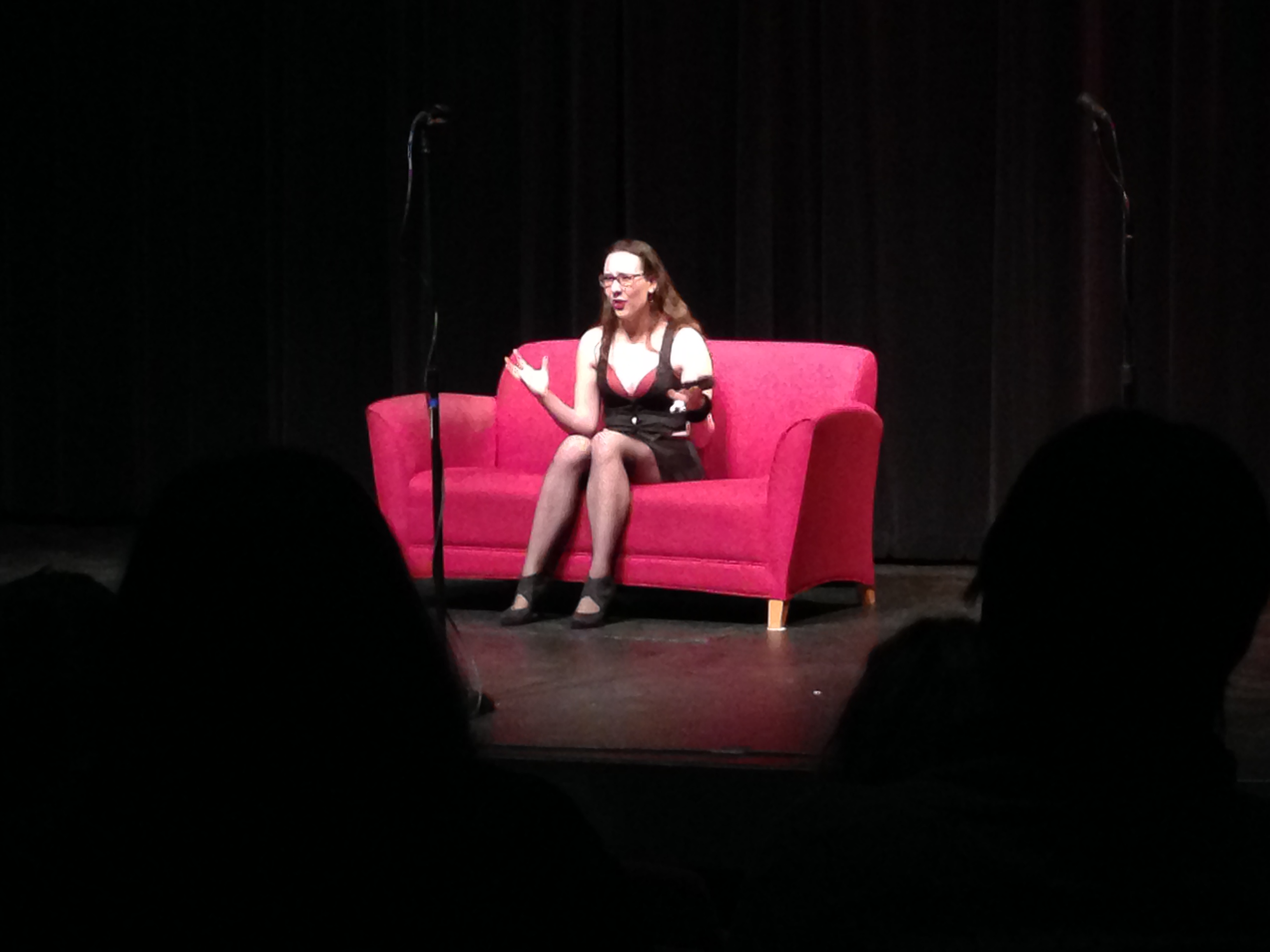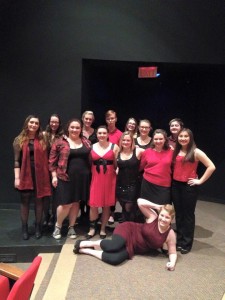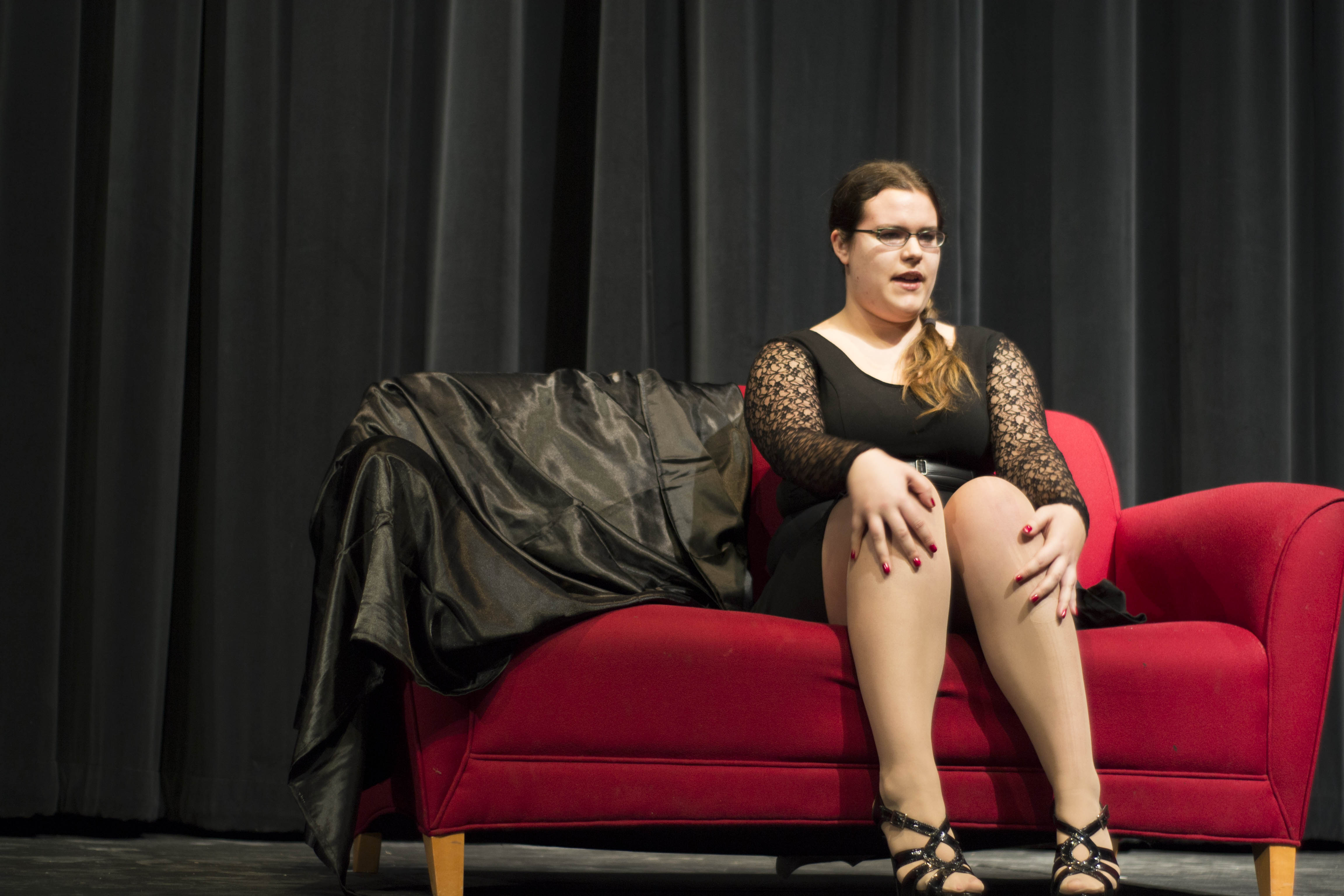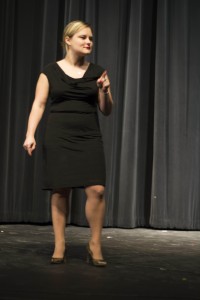On Friday, February 13, in celebration of Valentines Day, Chatham University Drama Club put on its annual performance of Eve Ensler’s 1996 episodic play, “The Vagina Monologues.”
The show–a gritty and unapologetic representation of women and how they feel about themselves–was a big success, filling almost all of Chatham’s Eddy Theatre.
Afterwards, Catherine Giles, the co-director, invited all attendees to a reception, taking place in Café Rachel and the Woodland Art Gallery.
As students slowly made their way from Eddy Theatre to the reception, staff members handed out free drink vouchers, and students set up food tables with cookies, cupcakes, vegetables, and–a student favorite–spinach and artichoke dip.
In addition to people socializing and discussing the show, various student organizations used the reception as an opportunity to get their messages out to the student body.
One such organization–Feminist Activists Creating Equality (FACE)–set up a table at which they sold cookies with vaginas drawn on them in icing.
At the table with FACE was a display about the website “The World Needs More Love Letters,” where they asked students to write letter of encouragement to people going through a hard time.

Photo Credit: Katerina Sarandou
In addition to random letters, this website also allows people to nominate family members who are going through a difficult time to receive personalized letters.
Another organization in attendance was the Chatham chapter of the International English Honor Society Sigma Tau Delta, headed by senior Kaitlyn Lacey. In a short speech, Lacey explained that the honor society would be sponsoring a 50/50 raffle to fundraise for a trip to an international convention in the spring where, “students will be presenting their work.”
After her speech, she passed the floor to Natalie Szewczyk, the Vice President of the Drama Club, co-director, and stage manager for the show.
After making a joke about how she was wearing something other than flannel (a rare occurrence for her), Szewczyk expressed her sincere gratitude to everyone who made the show possible, including the cast, the crew, her assistant Diana Cabrera, and Giles, because “without her the show wouldn’t have been as great as it was.”
Szewczyk then went on to introduce the Pennsylvania Organization for Women in Early Recovery (POWER), the featured organization at the reception, to which all of the show’s proceeds went.
“This wonderful organization called POWER…really touches my heart,” Szewczyk said, before explaining that the people at POWER, “help women rehabilitate and really change their lives.”
She then asked Karen Clark, volunteer coordinator at POWER, to say a few words about the organization and its mission.
“At POWER, we help women who are recovering from addiction,” Clark began. “Like the play we just saw, we talk about things that aren’t often talked about.”
She went on to explain that women require a specific approach to recovery and that they often don’t get that because there aren’t many programs that cater to their needs.
It is important to, “look at the whole person,” she explained, going on to say that POWER’s philosophy is to, “empower women.”
“I’m privileged to talk to them on a daily basis,” she continued, before saying, “and I’m so grateful to be part of this production.”
Clark ended by encouraging students to help the non-profit organization in any capacity that they could from simply giving money to volunteering for them.
At that point, the woman sitting at the POWER table with Clark who had, until then, remained quiet, stood to say a few words.
“I don’t often divulge that I’m in recovery,” the POWER mentor said, “but I want to break my anonymity so that you can see the face of someone you’re helping.”
The woman went on to say that she is eight and a half years clean.
“This is what programs like this do,” she continued, “There’s a better life out there. We want women to thrive…we don’t want to give them fish; we want to teach them how to fish.”
“It’s awareness,” she concluded, “but it’s also action.”
The theme of the night was captured quite well in the quote on the cover of “The Vagina Monologues” program, which read, “It means battling the violence happening around us. It requires strength, courage, and fierceness. It means not being silent.”
Whether it is violence from another person, or violence inflicted on oneself in the form of substance abuse, the show and subsequent reception addressed all facets of the issue and encouraged students to take a stand and try to help in whatever capacity possible.







